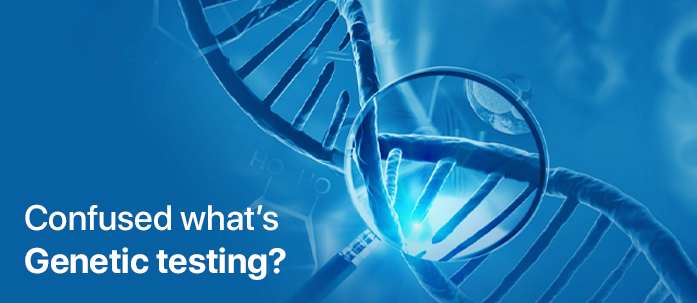GENETIC TESTING: A TEST FOR INHERITED TRAITS
Usually, when we talk about genetic testing our first thought is that it might be related to understanding ancestry. But that is just one of the applications. Actually, genetic testing has created a boom in the diagnostic world. Yoda diagnostics is proud to be the first diagnostic center in India that’s leading the path away from symptom-based prescription to Genomic based prescription. The genomic-based tests are helpful in establishing the diagnosis, predicting the future risk for chronic diseases, personalizing the therapy, and customizing the dietary requirements thus are emerging as holistic personalized health tools.
Understanding the role of DNA
All humans acquire genetic information from their parents in the form of DNA. That means DNA is the heritable component that will pass on to the following generations, any change in the DNA (mutation/variations) will also be heritable – the DNA will be called “Mutated DNA” that can lead to different genetic disorders.
Sometimes a person can acquire a genetic disorder even though the mutation is absent in the family. But how in the first place the mutation is acquired? The most probable explanation is mutagen exposure. This mutagen exposure can be passed further to the progeny in a given circumstance. So, it is important to understand your genome profile in case of unexplainable symptoms that a symptom-based prescription approach can’t cure.
Let’s take a real-life example
Neonatal diabetes is caused when insulin can’t deposit blood glucose in the pancreas. This is because the gene responsible for coding insulin is mutated. Even though a sufficient amount of Insulin is produced by the body, it can’t be utilized. Hence, babies with neonatal diabetes tend to develop Type I diabetes. Yoda provides a genetic panel for understanding hereditary causes of juvenile diabetes and MODY panel that identifies diabetes hereditary causes for youngsters These tests help in early diagnosis ultimately helping reduce the severity of the disorder and early treatments. Needless to say, we provide genetic tests for over 75000 genes.
Why is genetic testing important?
Genetic testing is important for understanding the molecular basis of a medical condition, as simple as that. There are many cases where the wrong diagnosis has led to inaccurate treatment and prolonged testing which happens to cause delays in getting effective care. The entire journey can be very painful for the patient, and the family sometimes for physicians as well. The generic term used here is the “Diagnostic Odyssey”. There are a few other reasons that point out the importance of genetic testing;
- Genetic testing has proved to be extremely important for those families where genetic conditions are heritable
- To understand the condition even before the symptoms are observed.
- To be familiar with the chances of having a genetic condition for future pregnancies
- To diagnose if you or your child have a genetic condition or abnormalities with/ without symptoms.
- Helpful for cancer prevention or treatment plan.
- Diagnosis of rare diseases for example; cystic fibrosis, and muscular dystrophy.
Genetic testing is extremely important
Genetic testing has revolutionized diagnosis. But how?
We only know about a few conventional diseases but there are many with unexplainable symptoms. In some cases, the patients are unable to explain what they are actually feeling, like Parkinson’s and Alzheimer’s. Another famous technique is Amniocentesis successfully adapted for fetuses to understand if there is any chromosomal disparity.
What is it that makes genetic testing so effective?
Talking about advantages, genetic testing is important because of the following reasons;
- Cost-effective: Many studies have shown that genetic testing has proved to be fruitful because it cuts downs the cost of unnecessary Hit and trial diagnoses and also guesswork treatments.
- Accurate diagnosis: Genetic testing exposes the root cause of more than 70,000+ diseases by accurately discovering mutations in one or more genes. Helping physicians understand phenotypes and plan better treatment for the patient. This approach has proven to be constructive in the case of rare diseases like Tay Sachs syndrome, cystic fibrosis, etc.
- End to diagnostic odyssey: Definitely, proper genetic testing helps patients and their families to at least understand the diagnosis and relieve them from the pain of unnecessary treatments, high costs, and lack of clarity from the physician’s end. Regardless to say it reduces the overall suffering.
Yoda suggests
Instead of the hit and trial method, genetic testing focuses on the direct approach. Few symptoms are not easy to understand and so they become even harder to treat. For a few disorders, there are no early symptoms but if detected they can be reversed or treated permanently. However, in the opposite case, the disorder can have an overall negative impact that can neither be treated increasing the mortality risk.
At Yoda, we offer a wide range of panels that deals with genetic studies and implement pharmacogenomics for treatment. We are here to build a better and healthier future.























